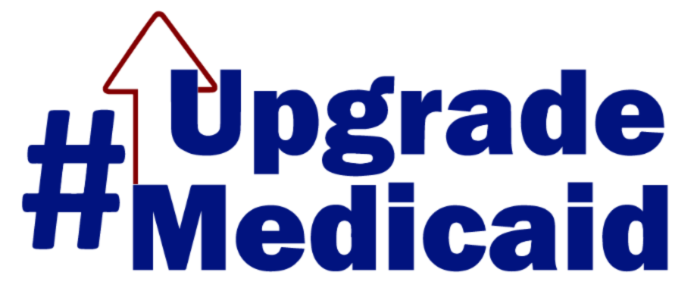This commentary was a group effort by Upgrade Medicaid organizers Jenn Wolff, Shelley Jaspering, Kyle Spading, Elaine Gartelos, Tucker Cassidy, and Evan Schultz. -promoted by Laura Belin
Thousands of disabled Iowans rely on Long Term Support Services through Medicaid. Those services were designed to provide daily living assistance for individuals to maintain normal lives in their homes.
Because of Medicaid privatization, some individuals have been forced to consider nursing home placement, which is typically more expensive than community living.
Shelley Jaspering of Ames uses a wheelchair due to a cervical spinal cord injury. Agency caregivers help her get out of bed and ready for work. She recently received a 30-day notice from her home care agency, stating her services will end after September 7. Then, Shelley faces the possibility of losing her Habitat for Humanity home and entering a nursing home. During the last three years, Shelley has trained more than 40 caregivers. Most had to pursue other jobs because of the low wages supported by Iowa Medicaid reimbursements.
Elaine Gartelos of Waterloo has Spinal Muscular Atrophy and uses a power wheelchair to stay productive and active. After Medicaid’s privatization, her caregivers weren’t getting paid – sometimes for months. Slow payments and low wages forced them to leave for better paying jobs. Home care agencies drastically reduced the hours of care she gets. Due to staff shortages, agencies left her lying in one spot in bed for 45 hours. Elaine lives with the threat of pressure sores and other health issues because of cuts to her services.
Kyle Spading of Fairfax is a former University of Iowa football player with a cervical spinal cord injury. He lives with constant uncertainty, not knowing if he can keep home care services at a level high enough to achieve and maintain employment using his master’s degree and certification in rehabilitation counseling. His agency’s staffing levels are affected by the low pay strains that Managed Care Organizations (MCOs) have pushed onto waiver-funded services.
These are just three of hundreds of personal stories heard since profit-based MCOs took over Iowa’s Medicaid system.
When Governor Terry Branstad privatized the Medicaid program, his stated goals were to:
1) Have greater accountability for outcomes.
However, the Republican-controlled Iowa House did not act on a Medicaid Managed-Care Improvement bill that would have provided strong oversight (Senate File 2213, passed by the Iowa Senate with bipartisan support in March 2016).
2) Improve quality and access.
Quantitative evidence is hard to find with no meaningful oversight. Qualitative evidence can be found on the Upgrade Medicaid website.
3) Create a more predictable, sustainable Medicaid budget for the state.
A DHS report suggesting Iowa could save $141 million annually from privatization seems unrealistic, since our legislature granted the MCOs an extra $334 million in 2018 and another $386 million in 2019.
Iowans being impacted by these issues don’t believe any of the goals are being met.
We challenge readers to contact your state legislators, Iowa Department of Human Services Acting Director Gerd Clabaugh, Iowa Medicaid Director Mike Randol, and Governor Kim Reynolds. You can find their contact information on the state employee directory.
Ask them to use taxpayers’ money more efficiently on community support services and caregiver wages to keep individuals in their homes.
Ask them to invest in Iowans with disabilities and the caregivers that support them.
Ask them to #UpgradeMedicaid!
Upgrade Medicaid is a grassroots group of individuals with disabilities “who are dedicated to building a space for Iowans to tell the stories that need to be seen and heard for Medicaid policy to change.” You can read their stories and follow them on Facebook or on the web at upgrademedicaid.com.

